The Christopher Pharmacy
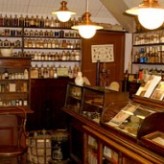
The shop is the reason for the Museum’s existence. When Miss Christopher was to retire in 1986, the shop would close for good and all its antique features would be sold off and dispersed, or consigned to a skip. With help from a grant from the Science Museum the newly-formed Museum Society purchased the furniture and old contents. A recreation of the shop was built...
Read MoreThe Museum Collection: Roman
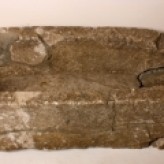
.
Bradford on Avon Museum does not hold excavated material from organised archaeological digs such as those at the Atworth and St Laurence School Roman villa sites. Objects excavated there are held by the Wiltshire Museum in Devizes, except for the St Laurence material from 2002 and 2003, which is still being examined at...
Read MorePharmacy equipment: Unguent jars
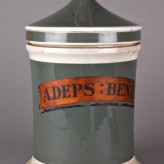
.
The Christopher Pharmacy, Bradford on Avon Museum
.
.
Creams and ointments -medicines mixed into fats and emulsified oils- which were mainly for treating skin complaints, were kept in ceramic jars with lids. Inevitably the lids got broken, so most...
Read MorePharmacy equipment: shop rounds
Shop rounds are the bottles that line the shelves of the chemist shop. They contain the ingredients of most of the everyday medicines made in the shop: tinctures, essences, powders, oils.
Tincture rounds have narrow necks for pouring liquids. This contains Tinctura Stramonii -tincture of thorn-apple, a poisonous plant.
Powder rounds have...
Read MorePharmacy equipment- Pill machines
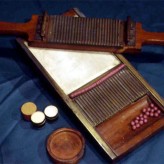
.
The Christopher Pharmacy at Bradford on Avon Museum, Wiltshire
.
.
The word pill is now used loosely of almost every solid form of medicine, but it really refers to a spherical object. The usual modern flat “pill” is more correctly called a...
Read MorePharmacy equipment – Tincture presses

Tinctures are extracts that are made from plant material -wood, bark, roots, seeds, stems and leaves- prepared by boiling or soaking in water, alcohol or other liquids to release the medicinal chemicals they contain. This stage of the process is called maceration.
The screw presses are used to crush the macerated source plant to get as much of the active ingredients as possible, which...
Read MorePharmacy equipment: Powders
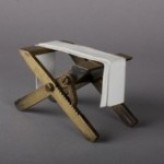
Taking medicine in the form of a powder, usually stirred into a glass of water, was more normal in the past than today, especially on the continent. Now you might take Andrews’ salts or a hangover cure such as Resolve.
Powders are made by grinding and mixing the ingredients in a mortar, then weighing or measuring them into doses.
Read More
Atworth
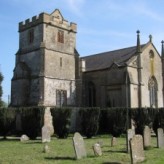
Most of the present parish of Atworth was originally part of the Manor and of the Ancient Parish of Bradford and its church was a chapel of Holy Trinity in Bradford. It was also known as Atworth Magna to distinguish it from a smaller area which was called Atworth Parva, Little Atworth or Cottles. The modern Civil Parish of Atworth was created on 19 December 1884 by detaching the...
Read MoreThe Museum Collection: Mollusc Shells

.
Bradford on Avon Museum has to be selective about objects of natural history that are added to the collection. This is because of the difficulties in preserving organic material. This restricts the collection to just mollusc shells and some skeletal material and teeth of vertebrate animals. However, the Museum is keen to...
Read MoreChemists & Druggists
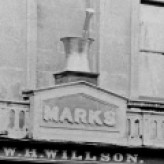
.
Bradford on Avon, Wiltshire
.
Bradford on Avon Museum’s main exhibit is the reconstructed Christopher chemist shop of 1863-1986. Before that there had been various apothecaries, druggists, chemists and ‘chymisters’. From the 19th century there were others...
Read More
